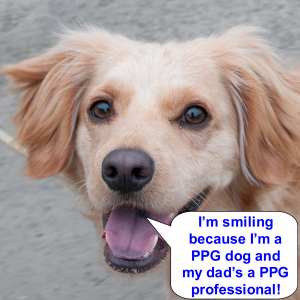This article first appeared in the July 2015 edition of the Downeast Dog News.
<You can listen to a companion podcast to this article, first broadcast on The Woof Meow Show on the Voice of Maine on June 27, 2015, by clicking here>
When this series started back in April, the intent was to alert pet owners that not all pet care services are pet-friendly and to emphasize the importance of making sure a pet has the most positive experience possible when it is boarding, day-caring, being groomed, training or while at the veterinarian. All of these animal care services can be done with a pet friendly approach; our pets deserve that. In this column I’ll be focusing on visits to the veterinarian and how many in the veterinary community are working to make those visits fear-free.
Few people look forward to visiting the doctor or the dentist so we should not be surprised when our pets get anxious at the veterinarian. A healthcare usage study by Bayer Veterinary indicated that 37% of dog owners and 58% of cat owners said their pets hate going to the vet1. Going to the vet can be a frightening experience and fear is a powerful emotion. According to Dr. Marty Becker, “Fear is the worst thing a social species can experience and it causes permanent damage to the brain.” As a Certified Dog Behavior Consultant, I work with many dog owners and their dogs, often on fear related issues. It is a basic survival mechanism that allows fear to be locked into a memory in an instant and that trauma can be remembered for a lifetime. While these fears may be overcome, it can often take weeks, months, and even years of work to do so.
Unfortunately, if we as pet owners and the pet care professionals handling our animals don’t recognize the signs and detrimental effects of stress and fear in our dogs and cats we cannot help them. In her blog The Science Dog, Linda P. Case recently wrote about fear and two research studies2 that examined how well owners and pet care professionals recognized and responded to signs of stress and fear in dogs. The first study indicated that over 90% of the people that participated could tell when a dog was happy; however, only 70% of dog professionals and 60% of dog owners could identify the fearful dogs. [bold emphasis mine]. That means a significant number of pet professionals and dog owners cannot tell when their dog is stressed or afraid. Clearly there needs to be more education in this arena.
The late Dr. Sophia Yin, a veterinarian and animal behaviorist, made it her mission to educate other veterinarians, pet professionals and pet owners on how people can better understand and interact with pets so as to reduce stress for all concerned. Her seminars, DVDs, and book on low stress handling of pets have helped pet professionals make their practices “pet-friendly.” When professionals can identify fear and stress, and know how to respond accordingly, they can make efforts to minimize or eliminate it so that pets actually enjoy visiting and being handled. At the same time, the skills learned help staff become more competent in animal handling, resulting in improved safety for all parties and reduced costs. Pet professionals, pet owners and pets are all benefiting tremendously from these practices3.
Many other veterinarians are also addressing this issue. Dr. Marty Becker is a veterinarian who is actively educating his colleagues on the importance of fear-free veterinary visits. In January, Dr. Becker presented on this topic at the North American Veterinary Community conference1, one of the largest continuing education events for veterinarians in the world. He talked about the Hippocratic Oath taken by veterinarians which emphasizes “First do no harm” and to “Cure sometimes. Treat often. Comfort always” [bold emphasis mine]. He discussed how the intense focus on medicine has caused veterinarians to sometimes neglect the parts about doing no harm. Dr. Becker continually underscores the value of making sure a patient is comfortable.
The trend toward fear-free veterinary visits is rapidly growing. A Google search of the words “fear free veterinary visits” yields about 819,000 results. The website DVM360, a website for the veterinary community, lists 19 articles on the fear-free philosophy from April 1st through June 5th alone.
With this trend, the move towards “Fear-Free” veterinary care is alive and well in Maine. Kate and I recently invited Dr. David Cloutier, from the Veazie Veterinary Clinic4, to join us on The Woof Meow Show to discuss his clinic’s approach to fear-free veterinary care. Dr. Cloutier is clearly very passionate about this topic. He explained how it’s not only the best approach for the vet, the vet’s staff, the pet owner and the pet, but is also personally very rewarding.
On our show with Dr. Cloutier we talked about dogs and cats and the fact that creating a fear-free visit for a cat is every bit as important as a fear-free exam for a dog however, because of a cats highly developed flight or fight instincts, doing so takes even more effort. Dr. Cloutier worries that if a cat owner has a bad experience taking their cat to the veterinarian that they may never go back to any veterinarian. This can result in very negative consequence for that cat’s health which is why making every visit a good one is so essential.
Some of the things that Dr. Cloutier and his team at Veazie Veterinary are doing to make a pet’s visit fear-free include staff training on behavior, stress, and canine and feline body language, having separate waiting areas for dogs and cats, being patient and allowing pets time to settle, minimizing restraint as well as the number of people in the room with the animal during an exam and treatment, using high-value treats to reward calm behavior and to desensitize a pet to any perceived threats, using pheromones like Feliway with cats to help calm them, and teaching clients what they can do at home to help prepare their pets for a visit to the vet.
It is essential for all pet care professionals to be following a pet friendly, fear-free philosophy if we are going to do well by your pets. If one of us causes a pet to have a fearful experience, due to the way the brain processes and remembers fear, that animal may now fear all of us.
Lastly, we talked with Dr. Cloutier about the role of the pet owner in reducing stress. That role starts with learning about your pet and signs of stress and discomfort. Next it requires you to be an advocate for your pet and all of the people that participate in your pet’s care. You not only need to make sure that pet professionals that care for your pet follow a pet friendly philosophy, but you also want to make sure that family members and friends that care for your pet also follow your philosophy. Your pet cannot speak for themselves so please ask questions and speak on their behalf. They’ll be glad you did.
Next month’s article will be focused on specific things you can do at home to help prepare your pet for a visit to your veterinarian, a boarding kennel, the groomer, or a training class.
References
1 Creating Fear Free® Veterinary Visits Puts Pets Back Into Practices -DrMartyBecker.com, Presentation at NAVC – http://www.drmartybecker.com/wp-content/uploads/2015/01/Creating-Fear-Free-Veteirnary-Visits-NAVC-15-FINAL.pdf
2 Fear Itself, The Science Dog, June 9, 2015, by Linda P. Case – https://thesciencedog.wordpress.com/2015/06/09/fear-itself/
3 http://drsophiayin.com/
4 http://www.veazievet.com/
Other Links of Interest
Signs of anxiety and fear in dogs from Dr. Marty Becker – http://dvm360.com/sites/default/files/images/pdfs-for-alfresco-articles/Signs_of_anxiety_fear.pdf
Links to the first two part of this series can be found below.
Selecting A Pet Care Provider – Yes! A Trend Towards Kinder and Gentler Professional Pet Care – Green Acres Kennel Shop’s “Pet Friendly” Philosophy – Part 1 – <Click Here>
Selecting A Pet Care Provider – Yes! A Trend Towards Kinder and Gentler Professional Pet Care – The PPG – Part 2 – <Click Here>
______________________________________________________________________________
Don Hanson is the co-owner of the Green Acres Kennel Shop (greenacreskennel.com) in Bangor. He is a Bach Foundation Registered Animal Practitioner (BFRAP), Certified Dog Behavior Consultant (CDBC), Associate Certified Cat Behavior Consultant (ACCBC) and a Certified Professional Dog Trainer (CPDT-KA). He produces and co- hosts a weekly radio show and podcast, The Woof Meow Show heard on The Pulse AM620 WZON and streamed at http://www.wzonradio.com/ every Saturday at 9 AM. A list of upcoming shows and podcasts of past shows can be found at www.woofmeowshow.com. Don also writes about pets at his blog: www.words-woofs-meows.com.
©2015, Donald J. Hanson, All Rights Reserved <Click for Copyright and Use Policy>
 Don and Kate have recently completed two new Woof Meow Show episodes where we answer a variety of questions.
Don and Kate have recently completed two new Woof Meow Show episodes where we answer a variety of questions.






